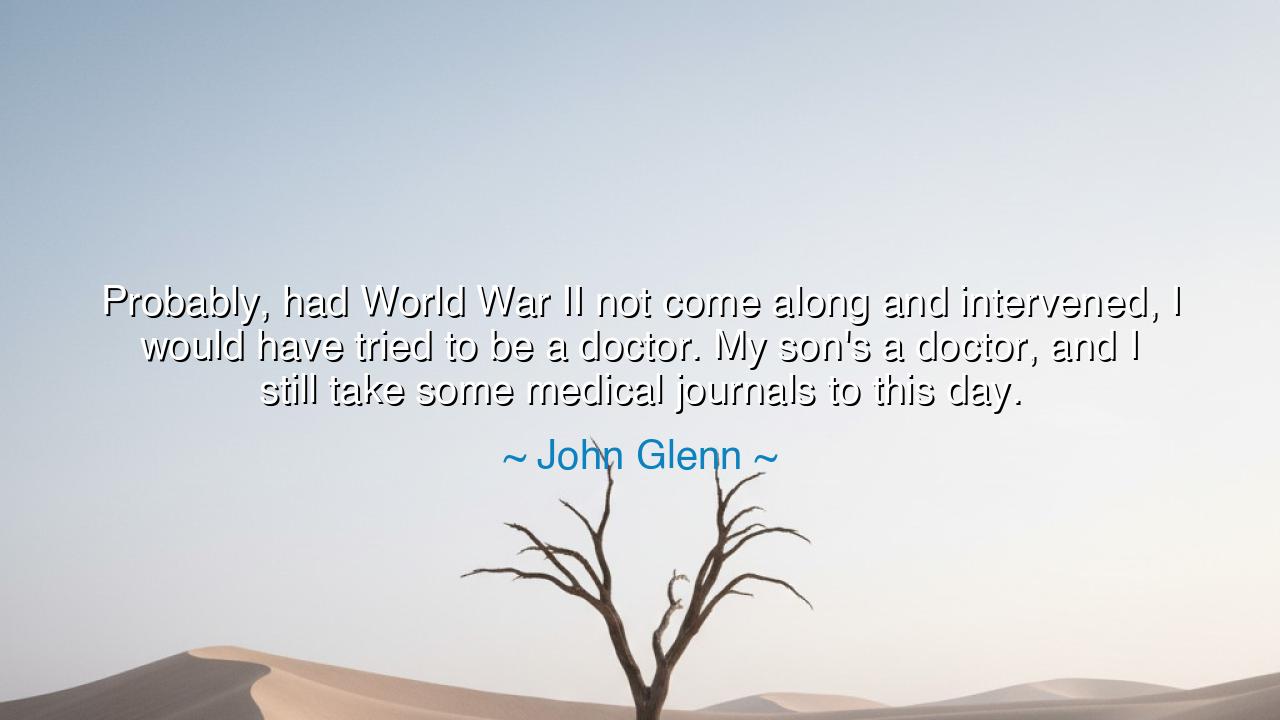
Probably, had World War II not come along and intervened, I would
Probably, had World War II not come along and intervened, I would have tried to be a doctor. My son's a doctor, and I still take some medical journals to this day.






Hear the words of John Glenn, soldier, astronaut, and statesman, who once reflected upon the path his life might have taken: “Probably, had World War II not come along and intervened, I would have tried to be a doctor. My son's a doctor, and I still take some medical journals to this day.” In these words, spoken with humility, we see the weaving of fate and choice. Glenn acknowledges that history itself redirected his course, pulling him from medicine to the cockpit, from the healing of bodies to the defense of nations and the exploration of the heavens. Yet within him, the calling of medicine never wholly faded.
The origin of this quote lies in Glenn’s youth. Before the outbreak of World War II, he studied engineering and considered a career in medicine. But destiny intervened: the war demanded pilots, not physicians. He answered the call of duty, becoming first a Marine aviator, then a test pilot, then one of the first Americans to fly beyond the bounds of Earth. Yet even as he embraced this heroic path, a part of him remained drawn to the healing profession. That spark, though unrealized in himself, found fulfillment in his son, who took up the physician’s mantle.
The ancients often spoke of fate as a river, carrying each man according to currents greater than himself. Glenn’s life embodies this wisdom. Though he dreamed of the physician’s art, he was swept instead into the furnace of war, where his courage was needed more in the skies than in the clinic. And yet, the longing for medicine remained—shown by his continued reading of medical journals, long after his career had led him elsewhere. It is a reminder that the heart holds many callings, even when history forces us to follow only one.
Consider the story of Ambroise Paré, the French barber-surgeon of the sixteenth century. He dreamed of healing, yet the wars of his day hurled him onto the battlefield, where he improvised new methods to treat the wounded. Like Glenn, his life was shaped by conflict. War pulled him from one destiny and forced him into another, yet he carried his passion for medicine into that harsh arena, leaving behind innovations that changed the practice of surgery forever. In both men, we see the same truth: history bends the road, but the yearning to heal never dies.
The meaning of Glenn’s words is not regret, but gratitude touched with wistfulness. He honors the path that history gave him—one that made him a symbol of courage and exploration—yet he confesses that in another world, without the shadow of war, he might have lived as a physician. By pointing to his son’s career, he shows the continuity of dreams across generations. What he could not fulfill, his family carried forward. This is the beauty of human legacy: that our unfulfilled longings can find completion in those who come after us.
The lesson for us is profound: life does not always grant us the path we imagine, yet we can still honor those early desires. Sometimes history calls us to serve in ways we never anticipated. But though circumstances may shift, we can nurture our passions in other forms—through family, through study, through quiet devotion. Glenn continued to read medical journals, feeding the flame of his youthful curiosity, even as he served his nation in other ways. He shows us that no interest is wasted, no love of knowledge is ever lost.
Practical action follows from this wisdom. If history steers you away from a path you once desired, do not cast aside that passion altogether. Let it enrich your life in small ways, let it live on in your family, your community, or in those you mentor. Encourage younger generations to take up the dreams you could not complete, as Glenn’s son did. And most of all, recognize that every road—whether toward healing, defense, or discovery—can serve humanity if walked with honor.
Thus Glenn’s words endure as testimony: fate may pull us from one destiny into another, but the heart’s yearnings remain eternal. Whether in medicine, in war, or in space, the spirit of service binds them all together. Let us honor our callings, even those unrealized, and see them reborn in the generations that follow. For in this way, no dream is lost, and every life becomes part of a greater tapestry woven by time.






AAdministratorAdministrator
Welcome, honored guests. Please leave a comment, we will respond soon